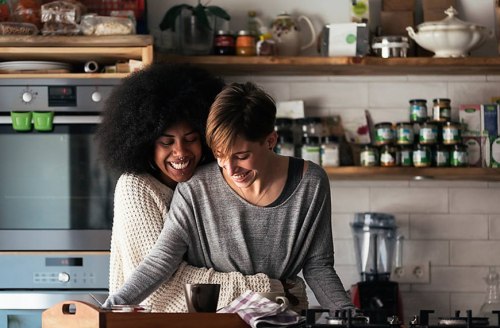Our editors independently select these products. Making a purchase through our links may earn Well+Good a commission
Codependency is one of those clinical terms, like disassociative episodes or anxiety, that gets casually tossed around so often its actual definition is hard to gauge. So, what does it mean to be codependent …really?
While part of human nature and relationships involve relying on each other, “when we need that person to make us feel important, to make us feel that we matter” that’s codependence, says Brian Jory, PhD, psychologist and author of Cupid on Trial. Rather than it being a choice or something that’s done out of enjoyment, codependent relationships are grounded in compulsiveness and desperation, he adds.
In extreme cases of codependency, the person in question will “build an identity for themselves around caring for their partner,” Dr. Jory says. “They value themselves only in their ability to take care of their partner but come up short in the skills of self-care.”
Although codependency has a mostly negative connotation and can be unhealthy, according to New York-based clinical psychologist Jordana Jacobs, PhD, it’s not always black and white. She says people can, in fact, have healthy relationships if the participants have a similar need and desire for codependency. “When you have two people who feel comfortable deeply relying on one another and are mutually communicative about their needs, then it is possible to function well within a codependent relationship,” explains Dr. Jacobs. Problems arise when “the dynamic is imbalanced, with one person desiring enmeshed codependence and the other desiring diffuse independence,” she adds. Telltale signs such a relationship is out of alignment include feelings of conflict, insecurity, and resentment, explains Dr. Jacobs.
Although some headway can be made for how to overcome codependency on your own using the pro tips below, this is just a jumping off point. Dr. Jacobs recommends seeking out a mental health professional. The information below is simply information to help you understand your feelings in a new light, something that may prove useful when talking to a trained and licensed therapist.
How to tell if you’re codependent

1. You talk about the person constantly
If you spend the majority of your time with your partner or friend with whom you have a codependent relationship, this could be an indication of an issue. Dr. Jory says to try to pay attention to how often you speak about the person—does it seem almost constant? Are they brought up in every conversation?
2. You’re a chronic and compulsive caregiver
For someone who is codependent, the basis of many of their relationships (whether platonic or romantic) is to act as a caregiver. If you find yourself in this situation it doesn’t definitively make you codependent; however, should you find yourself unable to remove yourself from this role, that may be an indication of codependent tendencies.
3. You’re constantly excusing bad behavior
Dr. Jory says that being defensive of someone or feeling a need to excuse their bad behavior or poor choices is another sign that you may be codependent. He explains that this can become toxic and unhealthy because it often leads to you feeling responsible for the other person’s actions.
How to overcome codependency

1. Spend time getting to know yourself
A key way to “help break patterns of codependency in relationships is figuring out who you are, what your purpose is, and what you like, outside of a relationship,” psychologist Danielle Forshee, PsyD, says. She explains that confidence and contentment with yourself and your path in life will help with confidence and the easing of codependent feelings and behavior.
2. Step out of your comfort zone
Another action Dr. Forshee suggests taking to overcome codependency is to “go out into the world and have new experiences—do something that makes you uncomfortable. Strengthen friendships, take up a new activity, learn to do things on your own.”
3. Figure out what you stand to gain and lose through codependency
Similarly, asking yourself questions like: “What do I gain by remaining codependent?” “What am I afraid will happen if I become a more independent?” can help you become more aware of what you’re seeking from codependent relationships Dr. Jacobs says.
4. Assess your own needs and their importance
“Codependency is fueled by a belief that the needs of others are more important than your own,” says Dr. Jory. That’s why an important part of rethinking your relationships with others is to identify your own needs. Recognizing the things you need to do to take care of yourself are an immense part of overcoming this issue. With your needs identified, you’ll at the very least have a greater awareness of what your needs are—and whether or not they’re being met. If not, prioritize them (and ultimately your happiness), stat.
If you’re in the dating pool, this is how to know when you’ve come across a softboy and how to stop looking for the catch with a nice guy.
Sign Up for Our Daily Newsletter
Get all the latest in wellness, trends, food, fitness, beauty, and more delivered right to your inbox.
Got it, you've been added to our email list.











